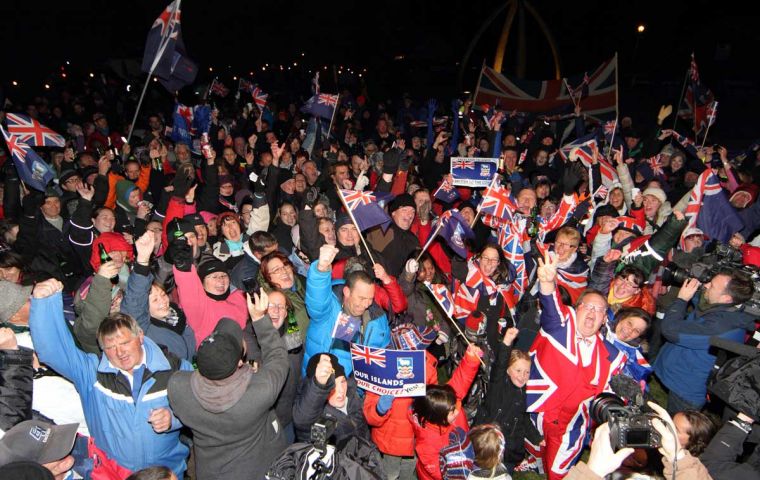MercoPress. South Atlantic News Agency
Falkland Islands Referendum, White Puffs of Smoke?
 Celebrations at Arch Green after the referendum results, but “I’ve got to work in the morning” (Pic by T. Chater)
Celebrations at Arch Green after the referendum results, but “I’ve got to work in the morning” (Pic by T. Chater) By Professor Klaus Dodds & Dr Alasdair Pinkerton - The celebrations on Arch Green, outside the Falkland Islands’ Stanley Cathedral, on Monday 11 March, revealed the strength of emotion and passion that has circulated around this referendum process, ever since it was announced in June 2012.
Lusty renditions of 'We are sailing', 'Rule Britannia' and 'God Save the Queen' were accompanied by the waving of flags, improvised disco lighting and excitement of the assembled residents fuelled by a generous allowance of beverages provided by a local company. It was a jolly, and distinctly British, affair. But the night was as understated as it was patriotic. There was not the display of fireworks or son et lumiere show that one might expect to see and hear following votes or referenda in other world cities. Talking to Islanders on Arch Green, it was made very clear that the Monday-night announcement and celebrations would be cut short. As one local man said: “Great night. We've shown the world what we believe. But I've got work in the morning”.
The referendum count was held in Stanley's Town Hall and was overseen by a team of international observers drawn from across North and South America and New Zealand. The mission's remit was to monitor every aspect of the referendum itself including the final counting was free, fair and transparent. Many of the ballot boxes had been either flown and/or driven in Land Rovers around the tiny communities of East and West Falkland including the outlying islands. Other votes were cast via proxies or postal voting. This was an extraordinary logistical exercise given that only 1518 votes were cast, and that there are only 1649 registered voters across the archipelago.
After two days of voting, local officials opened the labeled and much-traveled ballot boxes. For the next two and a half hours, every vote was carefully sorted, counted and cross-checked in a manner so deliberate and cautious that one of the accredited observers noted that in the equivalent time, in their home country, up to 40,000 might reasonably have been recorded. The same might also have been expected in a UK General Election, for example. What made this process so unusual was, of course, the scrutiny of the international media who had their cameras pointed expectedly at the electoral staff. During the final 30 minutes of counting there was an increasingly expectant atmosphere that built up in the town hall. Any movement form the chief returning officer prompted feverish speculation amongst the gathered media and local residents.
While the result had long been predicted, there had been a growing concern in the Falkland Islands about the possibility of both low voter turnout and a pro-Independence vote. Both fears turned out to be unfounded. Turnout was 92%, and the 'YES' vote was an extraordinary 99.8%. Only 3 'NO' votes were recorded. The cheering of the crowds inside the town hall, and later on Arch Green, were indicative of the Islanders approval of the news. Perhaps more telling were the polite laughs that greeted the announcement of the three 'NO' votes. This was a referendum not simply about demonstrating Islanders continuing commitment to remaining a UK overseas territory, but also about demonstrating that the referendum itself was conducted to the highest international standards. The head and the deputy head of the international mission were content to confirm that the referendum had, in their judgment, truly and honestly reflected the beliefs and spirit of the Falkland Islanders.
The legacy of the referendum will be much more difficult to predict than the voting itself. For the Falkland Islanders, they have both reaffirmed the status quo but also prepared the ground for possible future referenda, which might one day include independence as an option. For Argentina, a referendum that was condemned as 'illegal' has not changed their position on the Falkland Islands and might well lead to a reassertion of their claim in venues such as the United Nations. For Britain, as Prime Minister Cameron noted, the commitment to respect the wishes of the Falkland Islanders appears rock solid. This will inevitably require vigilance and a willingness to cultivate Latin American neighbors.
All sides will continue to press their agendas and the referendum itself and its legacy will get played in a variety of venues - both offline and online- including popular social media sites. In the hours following the celebrations on Arch Green, Islanders posted photos, videos, and comments on Twitter and Facebook provoking angry online reactions from Argentina. The referendum, while decisive, is not going to resolve the contested geopolitics of the South Atlantic. And neither will a papal intervention.




Top Comments
Disclaimer & comment rules-

-

-

Read all commentsKretina - take note!
Mar 22nd, 2013 - 02:49 pm 0Not for one minute would Argentina allow a referendum on remotely held islands. Not a bloody chance, by jove!
Mar 22nd, 2013 - 03:15 pm 0Keep Calm the Brits are Having a Referendum...
The fact of the matter is that Argentina have talked, gambled, war'd and blockaded themselves out of ever having any say: until they change their own attitudes.
Mar 22nd, 2013 - 03:45 pm 0They do, after all, only have to convince 1500 people, not the entire world.
How hard would that have been if only they could be peaceful & pleasant?
Commenting for this story is now closed.
If you have a Facebook account, become a fan and comment on our Facebook Page!